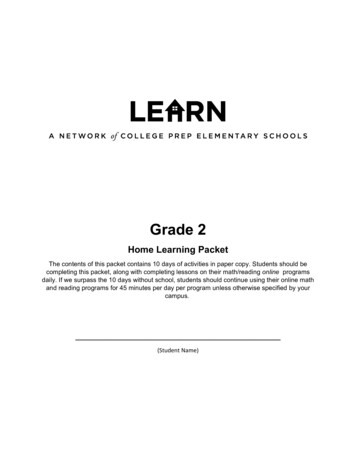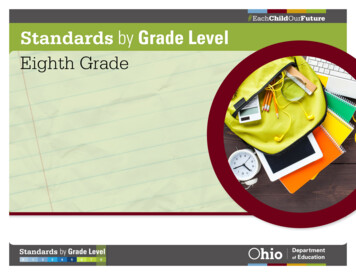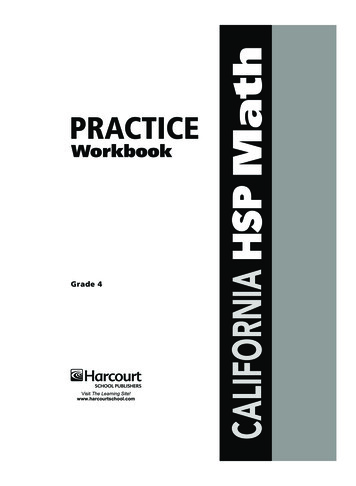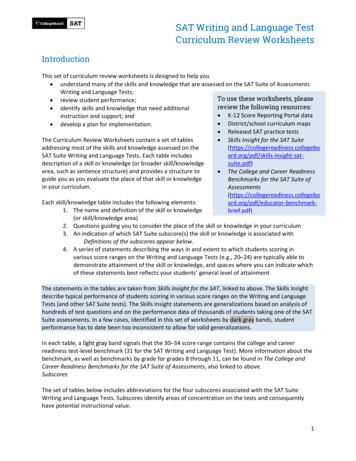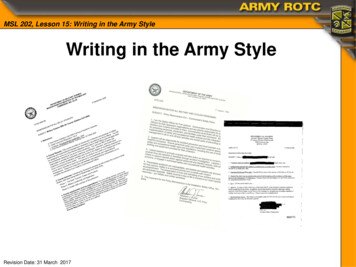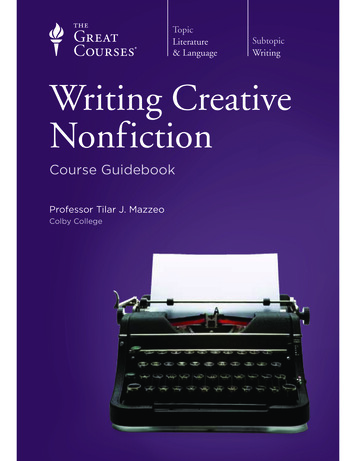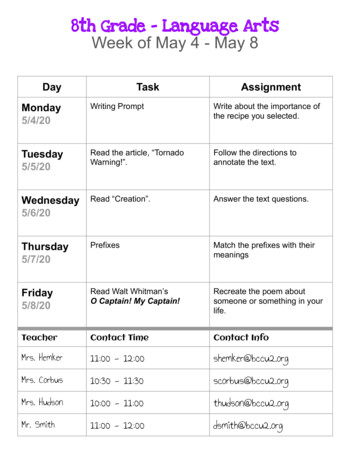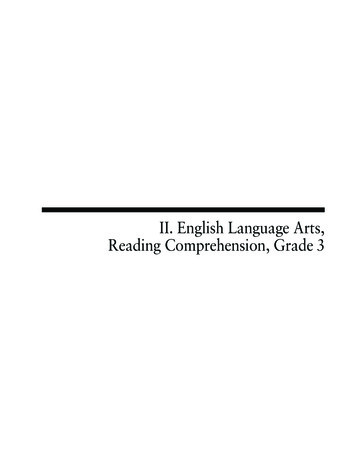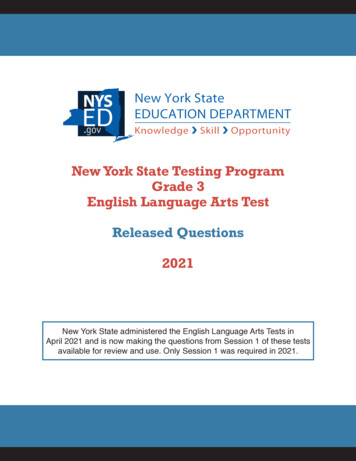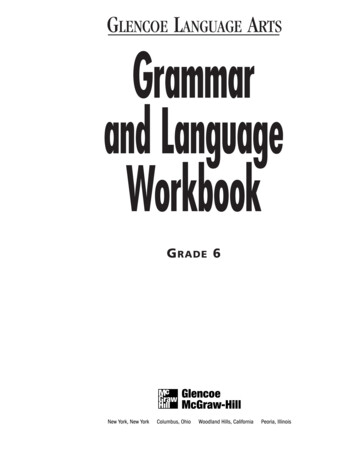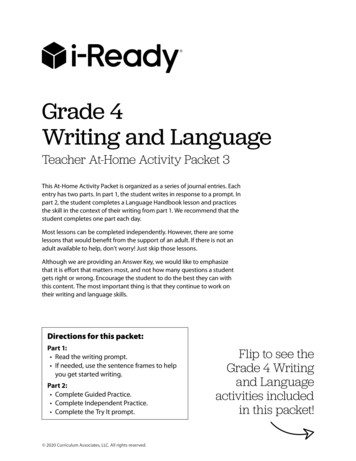
Transcription
Grade 4Writing and LanguageTeacher At-Home Activity Packet 3This At-Home Activity Packet is organized as a series of journal entries. Eachentry has two parts. In part 1, the student writes in response to a prompt. Inpart 2, the student completes a Language Handbook lesson and practicesthe skill in the context of their writing from part 1. We recommend that thestudent completes one part each day.Most lessons can be completed independently. However, there are somelessons that would benefit from the support of an adult. If there is not anadult available to help, don’t worry! Just skip those lessons.Although we are providing an Answer Key, we would like to emphasizethat it is effort that matters most, and not how many questions a studentgets right or wrong. Encourage the student to do the best they can withthis content. The most important thing is that they continue to work ontheir writing and language skills.Directions for this packet:Part 1: Read the writing prompt. If needed, use the sentence frames to helpyou get started writing.Part 2: Complete Guided Practice. Complete Independent Practice. Complete the Try It prompt. 2020 Curriculum Associates, LLC. All rights reserved.Flip to see theGrade 4 Writingand Languageactivities includedin this packet!
Table of ContentsGrade 4 Writing and Language ActivitiesEntry1Writing PromptPart 1ResourcePart 2Grade 4 ReadyLanguage HandbookLesson 10Capitalizing Names ofPlaces and ThingsJournal Entry 1PART 1Lesson #10X.#.#:CapitalizingLessonTitle Names ofPlaces and ThingsThink about a place in your city or town that is currently closed. Imagine youcould spend the day at this place. What would you do? Who would you bring?Introduction You know that a common noun names any person, place, or thing.A proper noun names a particular person, place, or thing. Remember to capitalize propernouns. When a proper noun contains more than one word, begin each important word witha capital letter.PlacesWest Park AvenueDurhamHanging Rock State ParkUnited States of AmericaAsiaGuided PracticeHINT When youwrite the name ofa place or thing, donot capitalize smallwords, such as a, and,or of.ThingsVeterans DayPen and Pencil Company, Inc.Green Bay PackersSaturdayFebruaryAnswer KeyPage7Guided Practice1. Fourth; July2. Kinsman Drive3. July; Monday4. Eagle Creek ParkIndependent Practice1. A2. C3. D4. BWrite each sentence correctly. Add capital letters where theyare needed.1 We have a big party in our town on the fourth of july.2 Before the holiday, people put up flags along kinsman drive.3 This july, the event will begin on monday afternoon.If I could spendthe day at I would 2020 Curriculum Associates, LLC. All rights reserved.24 There will be fireworks that night in eagle creek park.7Grade 4 Packet 3, Entry 1Part 1482Language Handbook Lesson 10 Capitalizing Names of Places and Things Curriculum Associates, LLCCopying is not permitted.Part 2Grade 4 ReadyLanguage HandbookLesson 11Punctuating DirectQuotationsJournal Entry 2PART 1Lesson #11X.#.#:PunctuatingLessonTitle DirectQuotationsYou awake from a strange dream. You hear your pets talking to each other. Thecrazy thing is that you can understand what they are saying. Write a dialoguebetween your pets.Introduction Using a direct quotation, or a person’s exact words, can help makeyour writing come alive. You can write the exact words of a character in a story, or you canwrite what someone in real life has said or written. Use quotation marks (“ ”) before andafter the exact words of a speaker or author. A direct quotation can come at the beginning of a sentence.“I can’t wait to see the Washington Monument!” said Elena. A direct quotation can also come at the end of a sentence. Use a comma (,) toseparate the beginning of the sentence from the quotation.Author Rachel White wrote, “The Washington Monument is one of the mostpopular tourist attractions in the United States.” Use quotation marks only when you are showing a person’s exact words, not whenyou are explaining what the person said.Nathan said, “I look forward to the trip to Washington.”Nathan said that he looks forward to the trip to Washington.Guided PracticeHINT Be sure theend punctuationafter a speaker’swords is inside thequotation marks.Example:Len asked, “Wherehave you been?”“I’ve been righthere!” I shouted. 2020 Curriculum Associates, LLC. All rights reserved.Grade 4 Packet 3, Entry 210484Add the correct punctuation where it is needed in each sentence.1 I’m almost ready to go! exclaimed Kris.2 Mr. Mendez said Before we go, we need to learn about theGuided Practice1. “I’m almost ready to go!”exclaimed Kris.2. Mr. Mendez said, “Before wego, we need to learn about theWashington Monument.”3. “Why did they build themonument?” Alva asked.4. Kris replied, “It was built tohonor George Washington.”5. “The monument is a symbol ofhis leadership,” wrote authorRachel White.10Washington Monument.3 Why did they build the monument? Alva asked.4 Kris replied It was built to honor George Washington.5 The monument is a symbol of his leadership wrote authorRachel White.Language Handbook Lesson 11 Punctuating Direct Quotations Curriculum Associates, LLCCopying is not permitted. 2020 Curriculum Associates, LLC. All rights reserved.Independent Practice1. D2. A3. BGrade 4 Packet 32
Table of ContentsGrade 4 Writing and Language Activities (Cont.)Entry3Writing PromptPart 1ResourcePart 2Grade 4 ReadyLanguage HandbookLesson 5Prepositions andPrepositional PhrasesJournal Entry 3PART 1Lesson 5#PrepositionsLessonTitle andPrepositional PhrasesYour town is building a treehouse. You and several friends have been asked tohelp. Write about the experience of building a treehouse for your community. Besure to tell how you felt. A prepositional phrase includes a preposition, a noun or pronounthat is the object of the preposition, and any words in between.object of preposition[][ ]Myka looked at the large tree . A prepositional phrase can describe a noun or a verb. It sometimesdescribes by telling how, when, where, or what kind.ExamplesMyka and Lily went outside after lunch.They sat under the oak tree.It was a good spot for a tree house.Lily showed Myka a book about tree houses.They could build a tree house by themselves.Guided PracticeBuilding atreehouse for ourcommunity was Page13Guided Practice1. behind the house2. in its branches3. During dinner,4. after school5. Sample: for them6. Sample: on a SaturdayX.#.#:Introduction A preposition is a word that shows the relationship between otherwords in a sentence. Words such as about, after, at, behind, by, during, for, in, on, and under areprepositions.prepositionAnswer KeyWhat They Tellwhen they wentwhere they satwhat kind of spotwhat kind of bookhow they could buildUnderline each prepositional phrase, and circle the preposition.Then finish the last two sentences by adding a prepositionalphrase to each.HINT1 The tall oak tree was behind the house.A prepositionalphrase can come atthe beginning, in themiddle, or at the endof a sentence.2 Myka and Lily would build their tree house in its branches.3 During dinner, they discussed different ideas.4 “Should we draw our plans after school?” Myka asked.5 Their dad could buy wood and nails.6 Myka and Lily decided to start buildingIndependent Practice1. D2. C3. A4. B5. A. 2020 Curriculum Associates, LLC. All rights reserved.4Grade 4 Packet 3, Entry 313Part 1472Language Handbook Lesson 5 Prepositions and Prepositional Phrases Curriculum Associates, LLCCopying is not permitted.Part 2Grade 4 ReadyLanguage HandbookLesson 7Run-On SentencesJournal Entry 4PART 1Lesson 7#Lesson TitleRun-onSentencesWrite about the best things you have done while school is closed. Be sure toinclude lots of details in your writing.X.#.#:IntroductionYou know that a sentence is a group of words that tells a completethought. A run-on sentence is two or more sentences that run together with a commabetween them or with no punctuation at all.Run-on: Julia is always helping other people she hardly has time for herself.Run-on: She tutors kids after school, she volunteers at a food pantry on weekends.Guided Practice1. correct2. run-on; We hope to keep it asurprise, so we will have to becareful.3. run-on; The party will be atStella’s house, and her parentswill help.4. correct16 One way to fix a run-on sentence is to split it into two sentences.Correct: Julia is always helping other people. She hardly has time for herself. Another way to fix a run-on sentence is to use a conjunction, such as and, but, so,because, or while, to join the two thoughts.Correct: She tutors kids after school, and she volunteers at a food pantry on weekends.Guided PracticeHINT When youuse the conjunctionand, or, so, or but tocombine twosentences, puta comma before theconjunction. Do notuse a comma beforethe conjunctionbecause.The best thingsI have done are 2020 Curriculum Associates, LLC. All rights reserved.Grade 4 Packet 3, Entry 4Read each sentence. Write R for run-on sentence or C for correct.Fix the run-on sentences by adding a conjunction or by dividingthe thoughts into two sentences.1 My friends and I want to have a party for Julia’s birthday.2 We hope to keep it a surprise, we will have to be careful.3 The party will be at Stella’s house her parents will help.4 Stella will invite Julia over for a nice lunch that day.16476Language Handbook Lesson 7 Run-on Sentences Curriculum Associates, LLCCopying is not permitted. 2020 Curriculum Associates, LLC. All rights reserved.Independent Practice1. C2. A3. B4. CGrade 4 Packet 33
Table of ContentsGrade 4 Writing and Language Activities (Cont.)Entry5Writing PromptPart 1ResourcePart 2Grade 4 ReadyLanguage HandbookLesson 8Commonly ConfusedWordsJournal Entry 5PART 1Lesson 8#Lesson TitleConfused WordsCommonlyYour community has many helpers that are there to help out duringemergencies. Sometimes it may be a neighbor that helps out. Other times itmight be a paramedic. Write about someone in the community who has helpedyou or someone you know.X.#.#:Introduction Homophones are words that sound alike but have different meaningsand spellings. Homophones are easy to confuse because they sound the same! Watch out for the homophones two, too, and to in your writing. The homophonesthere, their, and they’re are also easy to confuse.WordMeaningExampletwo“a number”Kira is excited about two things.too“also”She loves swimming, but she loves writing, too.to“in a certain direction”She goes to the pool almost every day.there“in that place”The swim team practices there.their“belonging to them”They try to improve their speed.they’re “contraction for they are” Next week they’re having a big meet. Learn the spellings and meanings of these homophones, too!no“opposite of yes”know “to be aware of”right “correct” or “opposite of left”write “to put down on paper”it’sitswould “under a certain condition”wood “part of a tree”“contraction for it is”“belonging to it”hours “units of time”ours “belonging to us”Guided PracticeThe community helper was The community helper helped 2020 Curriculum Associates, LLC. All rights reserved.619Grade 4 Packet 3, Entry 5Part 1HINT If you’re notsure which spellingto use for ahomophone, checkthe differentspellings and theirmeanings ina dictionary.478new “opposite of old”knew “past tense of know”Circle the correct homophone in parentheses ( ).1 Not many people (know, no) how fast Kira is.2 They (wood, would) not want to compete against her if they did!6 (Their, There, They’re) goal is for Kira to beat her own time. Curriculum Associates, LLCLesson #13Lesson TitlePreciseWords and PhrasesCopying is not permitted.X.#.#:Introduction What is the difference between a dog and a puppy? Maybe 10 years!If you just used the term dog, a reader would never know you meant a brown bulldog puppy.It is important to choose words and phrases that tell precisely the meaning you wishto convey. Using precise words helps to convey your ideas exactly as you intended.Vague: Parts of Hawaii have beendisappearing.Precise: Wetlands of Hawaii havebeen disappearing. Using precise phrases will help readers picture and understand what you mean.Precise: Tropical pineapples, mangos,and bananas grow in Hawaii.Vague: Many fruits grow in Hawaii.Guided PracticeHINT Ask yourselfwhich word or phrasebest helps youto picture orunderstand what isbeing described.Independent Practice1. A2. B3. D4. B5. C5 Kira is working hard to prove him (write, right).Precise Words andPhrasesWhat is the most prized object that you own? Write about it. Be sure to writedetails so others who read your writing will understand what your prized objectis and how much it means to you.194 He thinks (it’s, its) possible for her to be on the Olympic team.Language Handbook Lesson 8 Commonly Confused WordsGrade 4 ReadyLanguage HandbookLesson 13PART 1Guided Practice1. know2. would3. new4. it’s5. right6. TheirPage3 She has a (knew, new) coach who is helping her train.Part 2Journal Entry 6Answer KeyRead each sentence. Circle the word or phrase that conveys a moreprecise meaning for the vague underlined words. Tell a partnerwhat additional information each phrase adds to the originalsentence.Guided Practice1. a majority2. white-sand3. stretch4. clear blue5. Towering22Independent Practice1. D2. C3. D4. D1 Hawaii has a lot of the coral reefs in the world.a majoritya large number2 Oahu is filled with tourists who want to enjoy the island’sbeautiful beaches.white-sandpretty3 The North Shore is the ideal location to watch big-wavesurfing, as waves go up more than 30 feet high.movestretch4 Hanauma Bay, with its nice waters, is popular for snorkeling.My prized object is clear bluepleasant5 Tall mountains can be found on the “Big Island” in Hawaii.High 2020 Curriculum Associates, LLC. All rights reserved.Grade 4 Packet 3, Entry 622488Language Handbook Lesson 13 Precise Words and PhrasesTowering Curriculum Associates, LLCCopying is not permitted. 2020 Curriculum Associates, LLC. All rights reserved.Grade 4 Packet 34
Table of ContentsGrade 4 Writing and Language Activities (Cont.)Entry7Writing PromptPart 1ResourcePart 2Grade 4 ReadyLanguage HandbookLesson 14Punctuation for EffectJournal Entry 7PART 1Lesson #14IntroductionYou know that a sentence is a group of words that expressesa complete thought. Sentences can end with a period (.), a question mark (?), or anexclamation point (!). Using a variety of sentence types will make your writing moreinteresting to read.Sentence TypeExampleStatementSummer is my favorite time of year.QuestionWhat season do you like best?ExclamationThis summer, I went white-water rafting!CommandTell me when you get my photos. Instead of beginning a report with a statement, try beginning with a question.Statement: At the end of the summer, we went kayaking.Question: Have you ever tried kayaking on a hot summer day? If you want to express strong emotion, consider writing an exclamationinstead of a statement.Statement: Kayaking is an exciting sport.Exclamation: What an exciting sport kayaking is!Guided PracticeHINT Think abouthow the endpunctuation youchoose will affect theway the reader“hears” yoursentences andunderstandsyour meaning.I made a poorchoice when Others reacted by 2020 Curriculum Associates, LLC. All rights reserved.8Grade 4 Packet 3, Entry 725Part 1490Rewrite each sentence as either a question or an exclamation. Tella partner how the change in punctuation changes the meaning ofthe sentence.4 I enjoy kayaking. (exclamation) Curriculum Associates, LLCLesson 20#Copying is not permitted.X.#.#:Lesson TitleIdiomsIntroduction Have you ever been “in hot water”? When you hear these words, youmight think about taking a hot bath. Or you might think about being in trouble. Phrases inEnglish sometimes have more than one meaning. An idiom is an expression whose meaning is different from the meaning of itsindividual words. The idiom up to my ears means “very busy with.”I was up to my ears in homework when my friend Mai called. The phrase up to my ears has a literal meaning, too. The meaning of the phraseis the same as the meaning of the individual words.I was chilly, so I pulled my sweater up to my ears.Guided PracticeHINT If an idiomdoesn’t make sense,use context clues tohelp you understandit. Sometimes youcan also find themeaning of idioms ina dictionary.Read each sentence. Underline the idiom. Then circle the correctmeaning of the idiom.1 I knew Mai would talk my ear off if she had the chance.talk until my ear fell offtalk a long timetalk loudly2 So I said, “My mom will fly off the handle if I’m on the phoneand not studying.”throw a potget angrytake a trip3 I explained, “I’m in the doghouse because I didn’t do well onmy last spelling test.”in trouble sitting in a doghouse playing with the dog4 Mai said, “I don’t want to rock the boat, so come over later.”go boatingthrow rockscause problems5 It rained cats and dogs as I biked to Mai’s house.One time I changedmy mind about was darkwas foggyrained heavily6 I knew I had to make tracks, or I’d soon be completely wet.slow down 2020 Curriculum Associates, LLC. All rights reserved.Grade 4 Packet 3, Entry 828502Independent Practice1. B2. C3. B3 There are rocks ahead. (exclamation)Language Handbook Lesson 14 Punctuation for EffectIdiomsPART 1252 Kayaking is easy to learn. (question)Grade 4 ReadyLanguage HandbookLesson 20Journal Entry 8Guided PracticeSample answers:1. Do we all have to wearlifejackets?2. Is kayaking hard/easy to learn?3. Look out for the rocks ahead!4. Wow, do I enjoy kayaking!1 You all must wear lifejackets. (question)Part 2Have you ever changed your mind about something that you told a friend youwould do together? Write about that time. Tell what happened and how yourfriend felt.PageX.#.#:Lesson Title for EffectPunctuationSometimes we don’t make the best choices. Write about a time when you didnot make a good choice. What happened? How did others react to your poorchoice?Answer KeyLanguage Handbook Lesson 20 Idiomshurrytake a train Curriculum Associates, LLCCopying is not permitted. 2020 Curriculum Associates, LLC. All rights reserved.Guided Practice1. talk my ear off: talk a long time2. fly off the handle: get angry3. in the doghouse: in trouble4. rock the boat: cause problems5. rained cats and dogs: rainedheavily6. make tracks: hurry28Independent Practice1. C2. D3. A4. C5. BGrade 4 Packet 35
Table of ContentsGrade 4 Writing and Language Activities (Cont.)Entry9Writing PromptPart 1ResourcePart 2Grade 4 ReadyLanguage HandbookLesson 22Synonyms andAntonymsJournal Entry 9PART 1Lesson #22X.#.#:Lesson TitleSynonymsand AntonymsIf you could start a new city, where would you start it? Maybe in outer space orunder the ocean? Maybe in your state or in a different country? Write about yournew city. Write about where it is and explain what kinds of places you can find inyour new city.Introduction Words in English can have meanings that are similar or different. If youknow how two words are related, you can sometimes use the meaning of a word youalready know to understand the meaning of an unfamiliar word. A synonym is a word that has the same or almost the same meaning as anotherword. The words select and choose are synonyms.I try to select foods from all five food groups.I often seem to choose the same foods, though. An antonym is a word that has the opposite meaning of another word. The wordsforget and remember are antonyms.Sometimes I forget to eat different kinds of vegetables.I need to remember to vary my diet. If you find yourself using the same word again and again, replace the repeated wordwith a synonym. This will make your writing more interesting.Guided PracticeHINT You can usea thesaurus to findsynonyms andantonyms for manywords. Sometimes adictionary also listssynonymsand antonyms.My new city is The places in mynew city include 1031Independent Practice1. B2. D3. B4. A5. C1 I made a large salad with many vegetables.enormoustiny2 A salad is a meal that is easy to make.challengingsimple3 I used vegetables that are commonly grown in our area.unusuallynormally4 I bought them at our local farmer’s market.31Grade 4 Packet 3, Entry 9Part 1506nearbyLanguage Handbook Lesson 22 Synonyms and Antonyms Curriculum Associates, LLCCopying is not permitted.Part 2Grade 4 ReadyLanguage HandbookLesson 24Precise Words forActions and FeelingsJournal Entry 10Guided Practice1. S; A2. A; S3. A; S4. A; SPageRead each sentence. Write S next to the synonym for the underlinedword. Write A next to the antonym.distant 2020 Curriculum Associates, LLC. All rights reserved.Answer KeyPART 1Lesson 24#X.#.#:PreciseTitleLessonWords forActions and FeelingsThink about an animal that makes you smile. Write about that animal and tellwhy it brings a smile to your face.Introduction Vague words, like went, mad, and nice, do not often paint a picture ina reader’s mind. Precise words, like stumbled, fuming, and gentle, give more information.Often, you can use a thesaurus to find the precise word you need. Use precise action words and phrases to tell exactly what is nquirewhinehaltquizwailwrap up Use precise words and phrases to describe emotions and states of being.VaguehappysadshyGuided PracticeHINT Ask yourselfwhich word or phrasecreates the strongestimage in your mind.Also, look for clues inthe surroundingwords to help youdecide which wordsto dtickled pinksufferingbashfulRead each sentence. Circle the precise word or phrase that bestreplaces the underlined text.1 Female sea turtles go ashore at night to lay eggs on sandybeaches.walkmoveGuided Practice1. crawl2. Bewildered3. Caring4. deserts5. construct34Independent Practice1. B2. B3. A4. A5. Dcrawl2 Confused sea turtles will not lay eggs on brightly lit beaches.ShyBewilderedMysterious3 Kind people turn off their outdoor lights.GentleGoodCaring4 After laying eggs, a sea turtle goes away from her nest of eggsand returns to the sea.An animal that makesme smile is because rejectsquits ondeserts5 Volunteers have to put up fences to protect nest sites.prepare 2020 Curriculum Associates, LLC. All rights reserved.Grade 4 Packet 3, Entry 1034510Language Handbook Lesson 24 Precise Words for Actions and Feelingsconstructform Curriculum Associates, LLCCopying is not permitted. 2020 Curriculum Associates, LLC. All rights reserved.Grade 4 Packet 36
Journal Entry 1PART 1Think about a place in your city or town that is currently closed. Imagine youcould spend the day at this place. What would you do? Who would you bring?If I could spendthe day at I would 2020 Curriculum Associates, LLC. All rights reserved.Grade 4 Packet 3, Entry 17
PART 2Lesson #10CapitalizingLessonTitle Names ofPlaces and ThingsX.#.#:IntroductionYou know that a common noun names any person, place, or thing.A proper noun names a particular person, place, or thing. Remember to capitalize propernouns. When a proper noun contains more than one word, begin each important word witha capital letter.PlacesWest Park AvenueDurhamHanging Rock State ParkUnited States of AmericaAsiaGuided PracticeHINT When youwrite the name ofa place or thing, donot capitalize smallwords, such as a, and,or of.ThingsVeterans DayPen and Pencil Company, Inc.Green Bay PackersSaturdayFebruaryWrite each sentence correctly. Add capital letters where theyare needed.1 We have a big party in our town on the fourth of july.2 Before the holiday, people put up flags along kinsman drive.3 This july, the event will begin on monday afternoon.4 There will be fireworks that night in eagle creek park.482Language Handbook Lesson 10 Capitalizing Names of Places and Things 2020 Curriculum Associates, LLC. All rights reserved. Curriculum Associates, LLC Copying is not permitted.Grade 4 Packet 3, Entry 18
Independent PracticePART 2Conventions of Standard EnglishFor numbers 1–4, in which sentence are capital letters used correctly?1 A In the United States, Thanksgiving is celebrated in November.BIn the united states, Thanksgiving is celebrated in november.CIn the United States, Thanksgiving is celebrated in november.DIn the united states, thanksgiving is celebrated in November.2 A A similar holiday is celebrated in Canada on the second monday of october.A similar holiday is celebrated in Canada on the second Monday of october.CA similar holiday is celebrated in Canada on the second Monday of October.DA similar holiday is celebrated in Canada on the second monday of October.KnowledgeKnowledge ofof LanguageLanguageB3 A In north america, families give thanks as their ancestors from Europe did.BIn North america, families give thanks as their ancestors from europe did.CIn north America, families give thanks as their ancestors from Europe did.DIn North America, families give thanks as their ancestors from Europe did.4 A Last year we went to my aunt’s house on scudder st. in Amarillo.Last year we went to my aunt’s house on Scudder St. in Amarillo.CLast year we went to my aunt’s house on scudder St. in Amarillo.DLast year we went to my aunt’s house on Scudder st. in amarillo.Vocabulary Acquisition and UseB5 A My aunt served pie from Albert And Sons Baking company.BMy aunt served pie from Albert and Sons baking company.CMy aunt served pie from Albert and Sons Baking Company.Try ItReread what you wrote in Part 1 and underline the names of places.Then,checktoservedsee if anythe placesproperyou capitalize thoseD any.places? Remember, a proper noun is a particular person, place, or thing. Curriculum Associates, LLCCopyingis not permitted.Language Handbook Lesson 10 Capitalizing Namesand 2020CurriculumAssociates, LLC. All rights reserved.Gradeof4 Places Packet3, ThingsEntry 14839
Journal Entry 2PART 1You awake from a strange dream. You hear your pets talking to each other. Thecrazy thing is that you can understand what they are saying. Write a dialoguebetween your pets. 2020 Curriculum Associates, LLC. All rights reserved.Grade 4 Packet 3, Entry 210
PART 2Lesson #11X.#.#:PunctuatingLessonTitle DirectQuotationsIntroductionUsing a direct quotation, or a person’s exact words, can help makeyour writing come alive. You can write the exact words of a character in a story, or you canwrite what someone in real life has said or written. Use quotation marks (“ ”) before andafter the exact words of a speaker or author. A direct quotation can come at the beginning of a sentence.“I can’t wait to see the Washington Monument!” said Elena. A direct quotation can also come at the end of a sentence. Use a comma (,) toseparate the beginning of the sentence from the quotation.Author Rachel White wrote, “The Washington Monument is one of the mostpopular tourist attractions in the United States.” Use quotation marks only when you are showing a person’s exact words, not whenyou are explaining what the person said.Nathan said, “I look forward to the trip to Washington.”Nathan said that he looks forward to the trip to Washington.Guided PracticeHINT Be sure theend punctuationafter a speaker’swords is inside thequotation marks.Example:Len asked, “Wherehave you been?”“I’ve been righthere!” I shouted.484Add the correct punctuation where it is needed in each sentence.1 I’m almost ready to go! exclaimed Kris.2 Mr. Mendez said Before we go, we need to learn about theWashington Monument.3 Why did they build the monument? Alva asked.4 Kris replied It was built to honor George Washington.5 The monument is a symbol of his leadership wrote authorRachel White.Language Handbook Lesson 11 Punctuating Direct Quotations 2020 Curriculum Associates, LLC. All rights reserved. Curriculum Associates, LLC Copying is not permitted.Grade 4 Packet 3, Entry 211
PART 2Independent PracticeConventions of Standard EnglishFor numbers 1–3, which sentence in each group uses the correct punctuation?1 A The Washington Monument is huge!” Anna exclaimed.B“The Washington Monument is huge! Anna exclaimed.C“The Washington Monument is huge”! Anna exclaimed.D“The Washington Monument is huge!” Anna exclaimed.2 A The tour guide said, “The monument is more than 555 feet tall.”The tour guide said “The monument is more than 555 feet tall.”CThe tour guide said, The monument is more than 555 feet tall.DThe tour guide, said “The monument is more than 555 feet tall.”KnowledgeKnowledge ofof LanguageLanguageB3 A Author Carter Bailey wrote, More than 500,000 visitors go to the top of themonument in most years.”BAuthor Carter Bailey wrote, “More than 500,000 visitors go to the top of themonument in most years.”CAuthor Carter Bailey wrote “More than 500,000 visitors go to the top of themonument in most years.”DAuthor Carter Bailey wrote More than 500,000 visitors go to the top of themonument in most years.Vocabulary Acquisition and Use4 A The monument is temporarily closed for repairs, the officer said.B“The monument is temporarily closed for repairs, the officer said.C“The monument is temporarily closed for repairs,” the officer said.DThe monument is temporarily closed for repairs,” the officer said.Try ItReview the dialogue you wrote between your pets in Part 1. Lookfor the correct punctuation and the use of quotation marks. If you left anypunctuation or quotation marks off, add them in. Curriculum Associates, LLCCopyingis not permitted. 2020CurriculumAssociates, LLC. All rights reserved.Language Handbook Lesson 11 PunctuatingQuotationsGrade 4 Direct Packet3, Entry 248512
Journal Entry 3PART 1Your town is building a treehouse. You and several friends have been asked tohelp. Write about the experience of building a treehouse for your community. Besure to tell how you felt.Building atreehouse for ourcommunity was 2020 Curriculum Associates, LLC. All rights reserved.Grade 4 Packet 3, Entry 313
PART 2Lesson 5#PrepositionsLessonTitle andPrepositional PhrasesX.#.#:IntroductionA preposition is a word that shows the relationship between otherwords in a sentence. Words such
Write about the best things you have done while school is closed. Be sure to include lots of details in your writing. PART 1 476 Curriculum Associates, LLC Copying is not permitted. Lesson Title Lesson # X.#.#: Run-on Sentences Lesson 7 You know that a se
